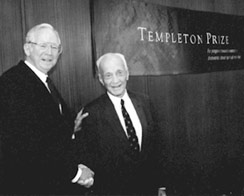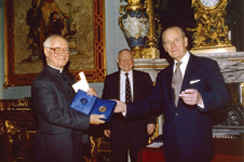| 
ABOVE: (Left) Dr. Holmes Rolston III with Sir John Templeton

ABOVE: Rev. Dr. John C. Polkinghorne accepting the 2002 Templeton Prize from The Duke of Edinburgh at Buckingham Palace as Dr. John M. Templeton, Jr., looks on.
| | |  | The Templeton Prize is the leading religion prize and among the world's largest monetary awards. Announced each spring at the Church Center for the United Nations in New York City, the prize is awarded to a living individual who has shown extraordinary originality in research or discoveries to advance understanding of God and spiritual realities. Recent winners include Freeman Dyson, Arthur Peacocke, Sir John Polkinghorne and Holmes Rolston III. The Duke of Edinburgh presents the award at a private ceremony at Buckingham Palace. The monetary value of the Templeton Prize is always set to exceed the Nobels to underscore Templeton's belief that benefits from advances in spiritual discoveries can be quantifiably more vast than those from other worthy human endeavors.
Years ago, Alfred Nobel endowed a series of now famous and generous prizes for breakthroughs in fields like physics, chemistry, medicine, literature and even peace. Nobel did not, however, endow a prize for religion, no doubt because he believed that no breakthrough in religion would merit such a prize.
Sir John Templeton challenged the belief that there could not be breakthroughs or progress in religion in 1973 when he created the Templeton Prize for Progress in Religion, awarded annually to “a living individual who has shown extraordinary originality in research or discoveries to advance understanding of God and spiritual realities.” The Prize, now much more than $1 million, is funded to provide recipients with greater financial rewards than does the Nobel. The first person the foundation recognized for the pursuit of spiritual knowledge was Mother Teresa.
“I am fascinated by the quality of the candidates nominated for the Templeton Prize,” says Dr. Bruno Guiderdoni, director of research at the Institute of Astrophysics of the Centre National de la Recherche Scientifique (CNRS) in Paris and one of several judges of the Templeton Prize. “We see people come in from very different horizons with very different achievements in their lives. It’s the only prize in the world that allows these people to be a part of the great ideas that are going to influence this particular century.”
“The prize’s interdisciplinary nature”, Guiderdoni notes, “is its greatest strength.”
“One of the problems we face in the disciplines is that the astronomers give the awards to the astronomers, or the preachers give the awards to the preachers. It seems that, in order to solve the problems, we need new ideas,” he said. “All of these people standing at the crossroads of the streams of science—the Templeton Prize gives them visibility they wouldn’t have otherwise.”
The prize celebrates endeavors that lead to spiritual insights that increase humanity’s precious store of spiritual information. Just as we value and expect a steady increase in our knowledge of medicine and technology, we must come to value and expect new spiritual insights and celebrate those thinkers that lead us to these insights.
Through the centuries, many charities have focused on education, healing and helping the poor. Sir John prefers to “encourage the concept that resources and manpower are needed to accelerate progress in spiritual discoveries, which can help humans learn vastly more about divinity. The Prize is intended to help people see the infinity of the universal spirit still creating the galaxies and all living things and the variety of ways in which the creator is revealing himself to different people. Progress is needed in spiritual discovery as in all other dimensions of human experience and endeavor. Progress in religion needs to be accelerated as rapidly as progress in other disciplines. It is hoped that there will result from this enterprise expanded spiritual awareness on the part of humankind, a wider understanding of the purpose of life, heightened quality of devotion and love, and a greater emphasis on the kind of research and discovery that brings human perceptions more into concert with the divine will. ”
Everyone is welcome to submit nominations for the prize, which are then passed on to a panel of judges drawn from the major religions of the world. The judges consider the nominees’ contributions to progress made either
during the year prior to their nomination selection or during their entire career. Contributions are evaluated in terms of their creativity, freshness, innovation and effectiveness.
As the years have passed, nominees have grown more diverse in both background and vision.
Dr. Baruch Blumberg, distinguished scientist at Fox Cancer Center and a Templeton Prize judge, says he admired prize recipients long before he became involved in the process.
“It was given primarily to scientists who had a lot of insight and who wrote about religious topics and how science related to religion,” Blumberg said. The most recent round of nominees “was more inclusive and the applicants reflected that, too.”
After such a rich history, the foundation is now looking for ways to alert an ever-widening segment of the academic community to the opportunities the prize affords. Holmes Rolston III, for example, used the entire prize money he won in 2003 to help endow a chair in religion and science at his alma mater, Davidson College in North Carolina.
“I think some work has to be done to make the prize well-known on a worldwide scale,” Guiderdoni said. “Because of the quality of people who win the prize, slowly but steadily the prize is going to be known as much as the Nobel Prize is known in science, literature or peace.”
More important than the prize’s financial cache or academic acclaim, though, is the synergy of ideas it creates.
“We need to encourage interdisciplinary approaches. We need new ideas. We need constructive engagement of ideas,” Guiderdoni said. “It’s very interesting to see, in the achievements of these people, what the big questions of humankind actually offer for the future.”
|